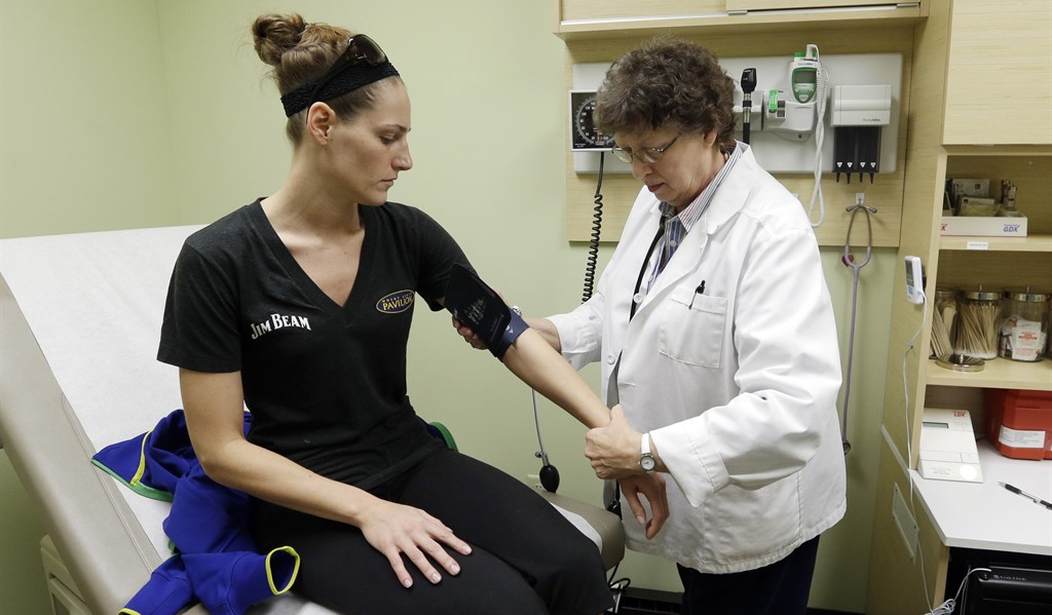As has been the case in each election since 2008, healthcare is figuring prominently as a major campaign issue. Previously, Obamacare had been the flash point, demanding fealty from Democrats and sparking disdain from the GOP. The rise of the Socialists among Democrats has pushed them so far left that single payer, nationalized healthcare is now one of their central talking points. The Bernie Sanders Medicare for All plan has 16 sponsors, some of whom are aspiring presidential candidates. A similar bill in the House has over 130 sponsors. Despite the enthusiasm among Democrats, their leadership at the DCCC are advising candidates to keep this idea to themselves for now, afraid that if the public catches on to their plans for a government takeover of healthcare, that many will turn against them.
Advertisement
A great deal of criticism of this plan has centered on the astonishingly high costs associated with nationalized healthcare and the realization that it is unaffordable. I focused on this in the companion piece to this article in Townhall on July 30. The following day, Charles Blahous from the Mercatus Center released his study on the cost of a single payer system. He reported that Medicare for All would add over $32 trillion to the federal budget during the first 10 years. He believes that this is a conservative estimate with it likely being more costly, and that even by doubling individual and corporate tax collections, it would fail to finance this plan.
The frightening thing is that the financial burden and the misery associated with it are not the worst parts of a socialized healthcare system.
First and foremost- socialized healthcare is failing around the world, and the victims are patients. Both The New York Times and Wall Street Journal recently reported the problems in Britain’s National Health Service (NHS) with exceedingly long waiting lists for care, the deteriorating conditions in hospitals, the rationing of care because of diminishing financial resources, and even the worsening of healthcare outcomes. Life expectancy and infant mortality have both worsened over the past decade. Twenty-four percent of patients have waited more than four hours to be seen in an emergency room. More than 9 million patients at emergency wards in 2016 were sent home with instructions to contact a pharmacist for care. Thousands of surgeries have been delayed or cancelled, and according to NHS CEO Simon Stevens, the waiting list to be seen will soon grow to 5 million people. Patients are forced to recover from major surgery in hospital corridors because of a lack of hospital beds, and there is a critical shortage of doctors and nurses. The problem is getting worse as the population of Britain is aging; much the same as in the US. In Britain, 24 percent of the population will be 65 or older within the next two decades.
Recommended
Advertisement
Canada, with its single payer system is no better, controlling costs by rationing care and limiting preventive services such as cancer screening. The average wait for an MRI is 11 weeks, 33 weeks for neurosurgery, and 20 weeks for “medically necessary” treatments. The number of hospital beds has shrunk by 40 percent since 1990. The US has long been the safety valve for Canada, with over 63,000 Canadians leaving the country to receive medical care in 2016. In 2010, Newfoundland premier Danny Williams was among those Canadians, traveling to Miami for heart surgery. The problem in the UK, Canada and everywhere else that has socialized medicine, is that when everything is "free", there is unlimited demand so that the only way to maintain the system is to either ration care, pay less for the services provided or both.
We already have a great deal of experience with socialized healthcare in the US- the Veterans healthcare system. This disgraceful system is a snapshot of what nationalized healthcare will look like when the federal government controls everyone’s healthcare. The problems seem almost too implausible to be real. Long wait times for care- sometimes for years, with patients dying on waiting lists. A medical record system that is so broken, that doctors cannot access patient information or that gives inaccurate data, resulting at times in fatal medical errors. A culture that is infused with indifference and lack of motivation- not by most, but by many. The VA has done veterans' healthcare wrong for decades, so why would we take a chance on turning over all of healthcare to the government?
Advertisement
The Left has no problem suggesting that doctors in the US are paid too much compared with their counterparts in England and Canada and feel that their incomes should be drastically cut. Unfortunately, the average debt for newly minted doctors in the US is nearly $200K but can be much higher. This is not the case in socialized countries. Things are not good for physicians in Canada where many cannot find a job, or in the UK, where doctors not supplementing their salaries in a private practice typically earn under 100K Pounds. Physicians in both countries are desperately trying to get to the U.S. to work.
The British Medical Association found that more than 60 percent of their physicians reported increased stress over the last year and low or very low morale in 50 percent. This has led to a threefold increase in early retirement, adding to the already alarming physician shortage. British general practitioners no longer find satisfaction practicing medicine and one commented that the only way to survive in today's NHS is "to take risks and cut corners."
In the U.S., even without the strain of a socialized healthcare system, things are no better for physicians. "Burnout" is a very real phenomenon and almost two physicians per day commit suicide. Bureaucratic overreach by government regulation, insurance red tape, intrusion into physician practices by "watchdogs", increasing overhead and decreasing reimbursement are but some of the problems that have contributed to the low morale of U.S. doctors. Socialized healthcare may be the “tipping point” for doctors. Leftists may regret this when they find themselves unable to find a doctor who will care for them.
Advertisement

























Join the conversation as a VIP Member